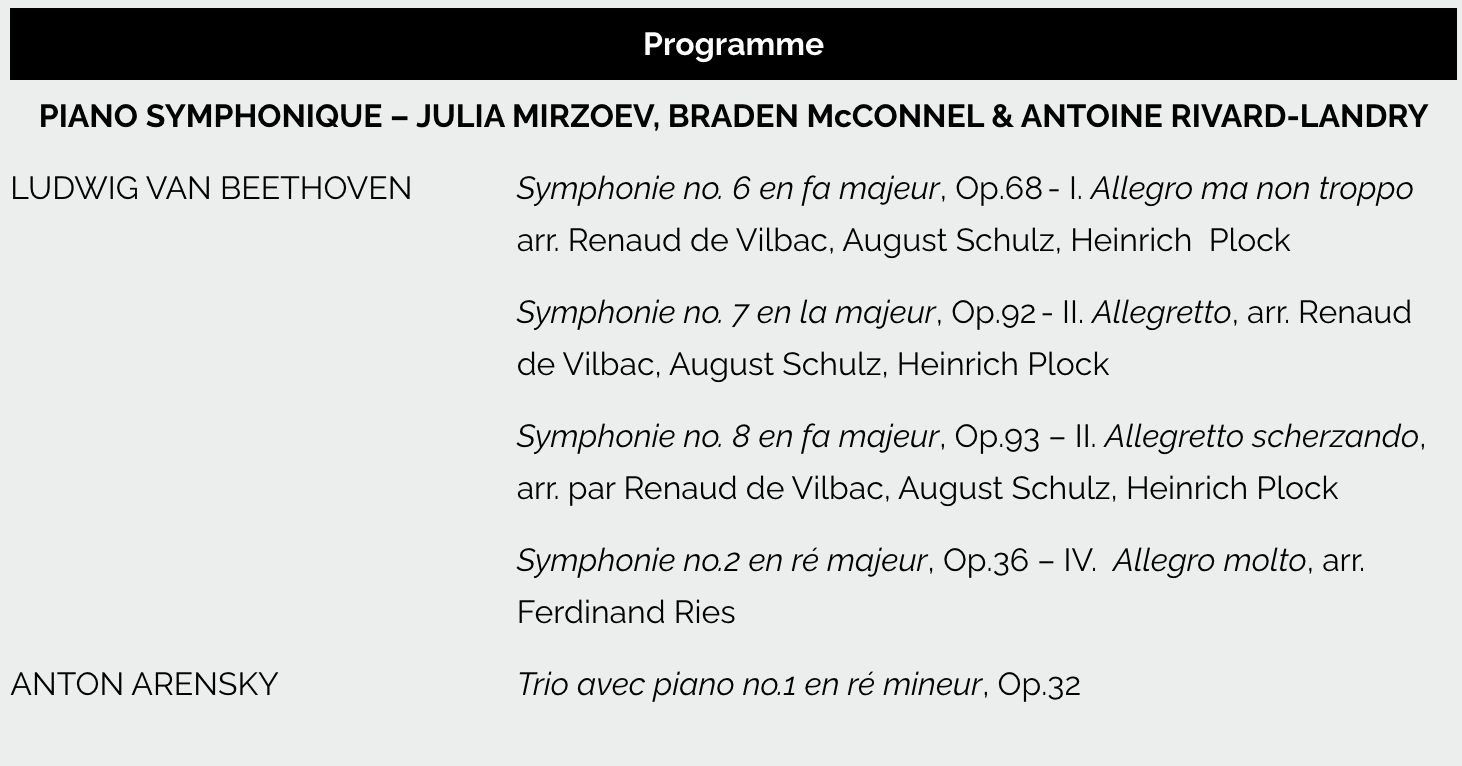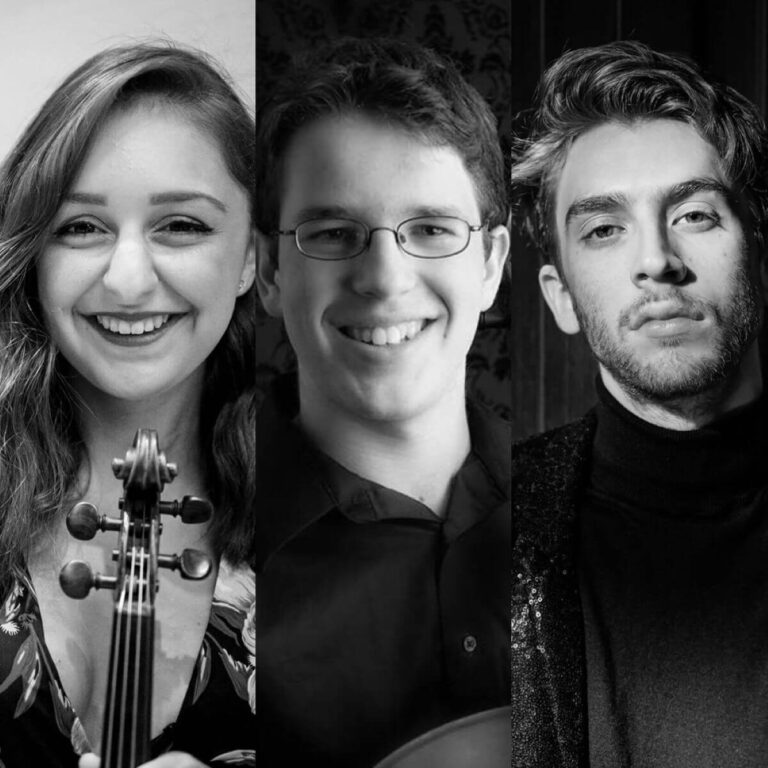Additional Information
Ahead of their program as part of Mélodînes presented by Pro Musica, I sat with violinist Julia Mirzoev, pianist Antoine Rivard-Landry, and cellist Braden McConnell to discuss adapting Beethoven and the exciting concert they have in store for us.
The trio will play at Salle Claude-Léveillée at 12 PM on April 3rd.

PAN M 360 : Hey everyone, thanks for taking time. I’m lucky to be speaking to all three of you. This piano trio program is rather unique and I was wondering how long you had to prepare this show?
Julia Mirzoev : Well we had a good amount of notice with this one, right?
Antoine Rivard-Landry : Yes, I think that the concept was clear from Pro Musica. It was really a question of figuring out what to pick as far as the repertoire is concerned. I feel like for a piano trio configuration the Beethoven symphonies were the most interesting choice, for sure.
PAN M 360 : I see, and exactly were the thematic guidelines that you had to follow?
Antoine Rivard-Landry : Well the theme is a piano symphonic. So basically symphonic works that have transcribed for piano or in this case, piano trio.
PAN M 360 : Oh I see. So arrangements of orchestral compositions that were not meant to be necessarily performed on the piano.
Julia Mirzoev : Yes, exactly! And so we end up actually having to fill in the roles of a lot of different instruments. So Antoine, of course, has many notes going on at once and Braden and I have to play double stops sometimes or some extra rhythms or extra lines that we wouldn’t have otherwise gotten to in the orchestral parts.
PAN M 360 : So were you all more or less familiar with the works before hearing them in a new arrangement?
Antoine Rivard-Landry : I think we were all more or less familiar with them. I knew all the movements of the symphonies but I had never heard them performed for piano trio. There’s the first movement of the famous Pastoral, for example, the slow movement of the seventh symphony, the minuet of the eighth, and the last movement of the second one. It’s almost like a mashup of some of his more well known symphonic works.
PAN M 360 : I imagine for the piano, these arrangements must be quite demanding,
Antoine Rivard-Landry : Well it’s surprisingly not that bad. The worst one is the last movement of the second symphony because it was written by Beethoven. And Beethoven with pianists is always a bit, you know, there’s no pity there. So it’s very big, but it’s also very fun.
PAN M 360 : I would love to hear how each of you sees the music of Beethoven.
Julia Mirzoev : Yeah. I think he was one of those, he was one of the first composers to make things really grand, really huge. Everything is just really large scale, but the actual music itself is quite pure, not simple though, but just very pure. So I think that kind of parallel is something unique and something that he made good use of.
PAN M 360 : I see, so perhaps you do see him as the bridge between the classical and romantic eras.
Julia Mirzoev : Oh yes.
Braden McConnell : He works with such a range of emotions and characters, and especially in what we’re doing, because we’re playing from the second to the eighth symphony, and I think that’s like 15 years of his career. And I think he had a sense of humour too, because there are these moments where it’s like fortissimo and then all of a sudden it’s all cute and tiny and then back to fortissimo again. And it’s just amazing to me how much range emotionally he can put into these tiny little ideas.
PAN M 360 : And as a pianist do you have a special relationship with Beethoven, Antoine?
Braden McConnell : I think so. For me he offers the best of both worlds because it’s very symmetrical and mathematical, but somehow it’s still very powerful and emotional music. So that’s the challenge of his music for me. It’s challenging to be playing something that is so perfect in its essence, but then so human as well.
PAN M 360 : And I suppose we should give Mr. Arensky his due. I had never heard of this program, what is his role here in the program?
Julia Mirzoev : Well, I think we wanted something contrasting from the Beethoven pieces which explore many thematic worlds and colours, but the Arensky piece is 30 something minutes of absolute lush romanticism. So it’s going a little further than Beethoven, you know, stylistically, but it’s perhaps not as rhythmically complex or, you know, symphonically complex, but it’s simply really beautiful music.
PAN M 360 : And perhaps what can you tell me about the process of taking orchestral work and adapting it for a piano trio? Does the violin or the cello take the melodic role most of the time?
Antoine Rivard-Landry : Oh, that’s a very interesting question. I suppose for some people that’s their job or life’s work. I suppose to do it you have to be a great composer. Those people who wrote the arrangements were great composers too. So I think you have to be a good composer and understand what an orchestra needs in order to construct it.
Julia Mirzoev : I think they probably use a lot of different combinations of substitutions. Sometimes Braden and I will get a different wind instrument, and so we have to emulate that, and the way that a horn solo would sound is a lot different than an oboe solo. We have to adjust accordingly and we can’t just play everything kind of the same way and expect people to buy it. We’re going to have to do our best to bring out the unique characteristics of each voice as they were originally intended.
Braden McConnell : One of the biggest challenges in it is there are moments where Julia and I will play what’s originally an oboe and bassoon duet and then all of a sudden it becomes a string and violin duet, and so we have to respond to each other in a new way. So to find a way to match the colour and the sound so that the first time we play it, you’ve got that kind of more nasally wind sound and then the second time the lusher string sound.
Antoine Rivard-Landry : For my part, sometimes I have to play the strings and it’s good that these two are here because I have to learn how to play a conductor as well. So sometimes they can teach me on, you know, how string players would actually perform certain passages in the orchestra.
PAN M 360 : And I suppose even though the arrangements have already been made, you also have to interpret their score and make it suit your vision?
Antoine Rivard-Landry : Yes for sure, that’s something that we stumble upon a lot. Sometimes I have to say the choices the arrangers made feel a bit weird to me. So that’s a discussion that we have time and again about whether certain sections could be made better. Whether it’s something that we need to adjust in the score or with the instruments, sometimes it’s not clear, but it’s a fun process figuring it out and sort of like being the judge of an arranger.
PAN M 360 : So do you feel you have the liberty to change something in the score if it doesn’t necessarily work for you?
Julia Mirzoev : Oh, yeah, because we’re playing something that’s not in its original form anyways. So that creates a kind of thickler line of what’s acceptable or not in amending the score.
PAN M 360 : Oh that’s fun.
Julia Mirzoev : It really is. And I think some of these arrangements were made a long time ago and you know, even editions of pieces that are standard are constantly being revised as more research gets done. There’s alway revisions happening in the professional editing world and so I feel that we are at liberty to make small changes based on Beethoven’s actual music, but of course we’re not trying to change the whole thing.
Braden McConnell : Yeah, and there’s a certain difference in goal as well, because some of these arrangements were made with the purpose that if you wanted to listen to a Beethoven symphony and you couldn’t get an orchestra together, you should get three friends together and play it in your living room. Whereas now, with an audience full of people who can go on Spotify and listen to 16 different versions of Beethoven’s sixth, sitting patiently and watching us in a concert hall, there’s a certain expectation that it not just kind of reflect the music but we have to convince them that there’s a reason to play it for a piano trio instead of in a symphony.
PAN M 360 : Well that’s an excellent note to end on, I think. We’re very excited for this concert, and it’s soon! I imagine you have one or two more rehearsals ahead of you?
Julia Mirzoev : Oh no, more like three or four.
PAN M 360 : Well best of luck, thanks again!
Julia Mirzoev : Thank you, see you on the 3rd!
























